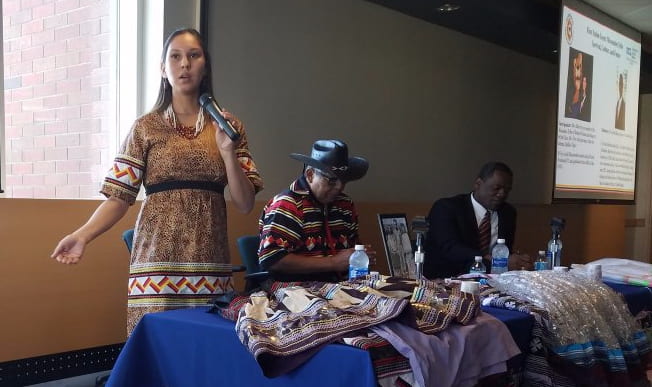David Perez
Contributing Writer
November for many is synonymous with Thanksgiving, the famous holiday where the families join one night to eat turkey and to give thanks for the good things that have happened to them.
But November also holds many other celebrations. One of them is Native American Heritage Month, which commemorates the history and traditions of the Native American peoples of the nation. This was the central topic of the presentation held on Nov. 8 in the Central Campus Library by Althea Frye, who is a member of the Miccosukee Tribe of Florida and graduated with an MBA from FIU.
The conference started with Frye talking about the outfits worn by the Miccosukee and the fabrics they used.
“Our original outfits were made from whatever we could find: Deer and even hogs,” Frye said. “In fact, Miccosukee means King of the Pigs.”
Frye showed some patchwork designs to the attendees, which the Miccosukee elaborated based on things they saw, including birds, lightning and even telephone posts. Then she passed the microphone to the second speaker, her uncle Pete Osceola Jr., who belongs to her same tribe and has a degree in business. After greeting the attendees in native Miccosukee language, he proceeded to speak about the society of their tribe and how they were living before the Europeans arrived.
“Everything was clean, we had no warfare back then,” Osceola said. “Your supermarket was nature; your school was the environment and your home was the earth you were standing on.”
Osceola explained that in Miccosukee culture, the women are more important than men, as women are the ones who carry on the clan’s future. He also spoke about the tribe’s beliefs and how it influences their conception of land.
“We can live on the land, but we can’t ever own it or sell it,” Osceola said. “In our culture, God made the land; we can’t sell or own something that isn’t ours.”
After Osceola’s intervention, there was a turn of questions. Someone from the audience asked about how the two speakers, as Native Americans, saw the cultural use of Indians in media and symbols, like the Florida State Seminoles. Frye didn’t seem bothered by it; in fact, she was even positive about it.
“I don’t see it with a hundred percent negative view,” Frye said. “In fact, I enjoy it because it gives me an opportunity to talk about my culture and my history. Some people are amazed to know that the Native Americans are still around.”
Osceola then talked about the symbols of the Miccosukee, like the flag, which had many meanings. One of them was the four races, but it also represented the four points of the compass. He then mentioned that Miccosukee used to live in the north, but had to move south to Florida due to pressure from the Federal Government.
“When the boats came in to Tampa Bay, some of us stayed here and fought,” Osceola said. “Some people called us freedom fighters, some people called us rebels and some people just called us survivors.”
Another topic of the talk was how Miccosukee perceived holidays like Columbus Day or Thanksgiving. Regarding Columbus Day, Frye said that her tribe not only doesn’t celebrate it, they don’t even acknowledge it.
“For us, celebrating Columbus Day.” Frye said, “Would be like having the Miami Cubans celebrate Castro’s birthday.”
They take a different position with Thanksgiving, which they indeed celebrate, but not in the way most of the Americans do.
“We celebrate Thanksgiving,” Osceola said. “Because it’s the time when we can eat without taking any risks or danger.”
The title of the conference was “Survival, Culture and Future” and future was the closing subject, the future of the Miccosukee. Both speakers showed different perspectives on it.
Frye seemed pessimistic and foreshadows a decline.
“If things continue as they are, I sense a huge decline. But fortunately, some kids who left the tribe are returning to it,” she said.
While Osceola showed a more optimistic view.
“As a nation, as a clan, as people we survived the Europeans and the Americans,” Osceola said. “We learned to adapt, we learned to move forward. And I believe the Miccosukee will adapt and survive.”
